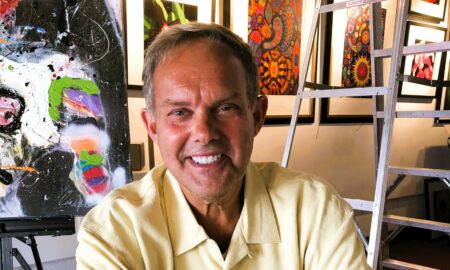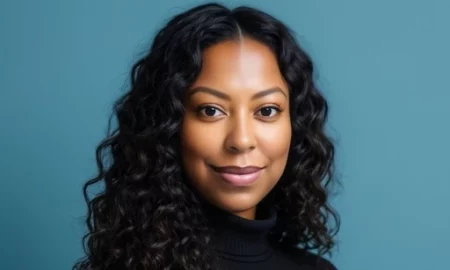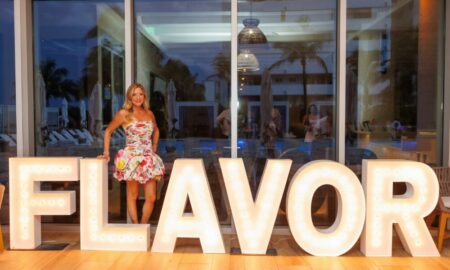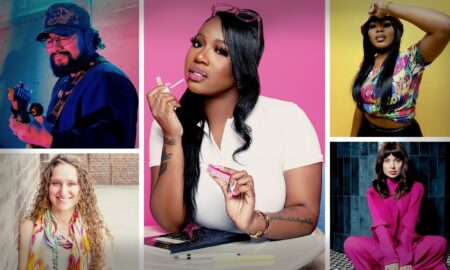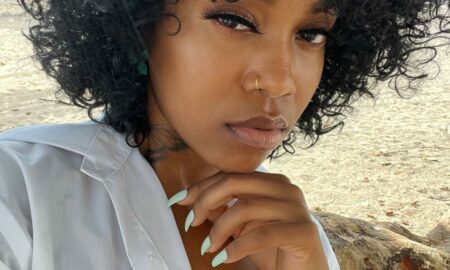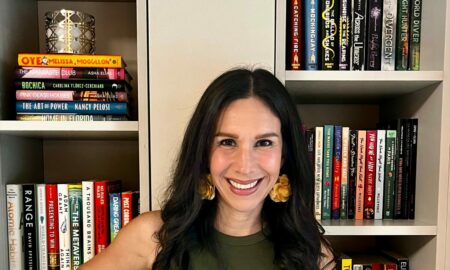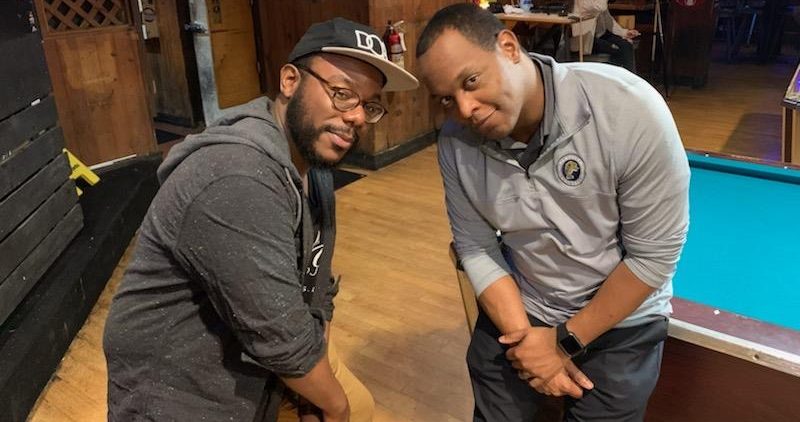
Today we’d like to introduce you to Anthony Teague and Emani Jerome.
Anthony and Emani, please share your story with us. How did you get to where you are today?
Anthony — I am truly an example of the old proverb that “it takes a village to raise a child.” I am originally from Dallas, Texas, and grew up for the first 13 years of my life with my mother and two of my three sisters. From as early as I can remember, I was the “man of the house.” Like so many single mothers, my mom worked tirelessly to provide for me and my sisters, but with little more than a few hours of college credits to her name, you can imagine the challenges of providing for young children with little to no outside support. We experienced homelessness for many years, knew what it was like to not know where our next meal was going to come from and learned many adult lessons quite early in life. I share this context because it was during these years, where I began to understand the power of mentorship.
As my mother could not always be physically available to watch over me and my siblings, she heavily depended on clubs, sports, trusted family friends and school to provide us with the structure we critically needed. My little league football coaches became the firm father figures I didn’t have at home, my band teacher took a specific interest in me and help me understand to the power of music and family friends opened their doors to me for sleepovers on schools nights, knowing that the dinner I ate at their table was filling a belly that might’ve gone to bed hungry. Upon realizing my family’s financial struggles, my Boy Scouts Scoutmaster bestowed upon me an unspoken “scholarship” that covered everything from uniform costs to summer camp and camping supplies. These strangers, who had no moral obligation to go out of their way to help me and my family, truly saved our lives.
Fast forward a few years, and I would later be adopted by an elder aunt and uncle of my father’s family in Chicago. Growing up with the family matriarch meant an iron fist style of parenting that I simply had not experienced. My aunt and uncle, and the large family that surrounded them, provided me with a level of structure, guidance, and accountability that I had not experienced before. My aunt ingrained in me a deep sense of self-reliance, determination, resilience, and integrity. She did not except excuses on any level and preached the importance of being a person of your word and being of service to others.
These aspects of my journey created in me a sense of service and advocacy that has guided me throughout my career. After college, I set out to find opportunities that would allow me to work in spaces and communities where I could truly be of service to others. My professional journey began as a full-time volunteer with a local Miami AmeriCorps program, City Year Miami. During my first volunteer year, I got the opportunity to work with community stakeholders across the county to develop large-scale service projects, helping transform once dilapidated and glum spaces into a place where students and families could feel comfortable and appreciated. My 2nd year as a volunteer, I had the opportunity to lead a team of 12 AmeriCorps volunteers, implementing targeted academic and SEL intervention programs while serving in the historic Miami Gardens community. Over the course of almost 7.5 years, I had the opportunity to help lead countless volunteer and staff teams, help evolve our program model to meet the needs of students and guide the cultural and social competency development of hundreds of eager young people.
After my time with City Year, I knew I wanted to find a way to continue deepening my understanding of the forces that perpetuate deep divides and opportunity gaps for students and families of color, which brought me to my current role working in higher education. I would go on to take on an adjunct role, helping struggling college freshmen reflect on the challenges they were facing and map out a plan to ensure they remain on a path towards graduating. Teaching was deeply fulfilling, but there was still something missing. I deeply missed the hard conversations on race, privilege, equity, and leadership that had become commonplace during my various roles working in the non-profit sector.
A year in a half ago, I received a random request to help an organization put together a “social justice” workshop for high-school students from diverse backgrounds, with a goal of helping students find points of connection and gain a deeper understanding of the concept of privilege and justice. I immediately pulled in long time friend and colleague, Emani Jerome, and we began our path towards what has become a genuine passion project, Bridge Builders 305. With every workshop we build and facilitate, particularly amid the current social unrest across the nation, we learn further how critical the work we have set out to do is.
Emani — For me, the real beginning of a lot of this work started when I was in graduate school at Florida State University. As a graduate instructor, I taught several Freshman writing courses geared towards students who—like me—were the first in their families to attend college. Many of these students were athletes, and I found myself tutoring many of them several times a week in addition to my course. One young man in particular really stuck with me, who I will call John. John was a bright young black man from Miami who played football for FSU, but was reading and writing on perhaps a 9th-grade level. It was clear to me that somewhere along the way, someone failed this young man. He was intelligent, passionate, and like a lot of black boys growing up in tough neighborhoods, he saw sports as his way to upward mobility.
John eventually suffered a concussion that threatened his football career, and it really hurt me that if he could not continue to play, he would likely be unable to hold down other jobs given his poor reading and writing skills. I decided I wanted to learn how a system could send this young man to college with such a lack of education. That’s when I got very interested in education equity, non-profit work, and moved back to South Florida to work for City Year Miami. At City Year, I got a chance to work in the very high school my former student John was from, and I learned first-hand that these are extremely complicated situations. Teachers who knew his value but did not see a means of helping him get out of poverty other than to rally behind his athletic ability rather than his academics. Who was I to blame them? This harsh reality was my entry point to work focused on social impact, social justice, and organizational psychology.
I held the role of Learning and Development Manager for City Year Miami, and it was my job to train and educate our AmeriCorps members to not only help the students they were assigned to, but to better help them understand their role in social impact work and the things that were not their role. I trained our AmeriCorps members to know that they were not saviors; they were not there to judge these students or to keep a holier-than-thou attitude with the administration or parents. Their job was to help and to do so in the most cultural competent way possible—especially given that more than half of our AmeriCorps members were young, white, college-educated people who were not from Miami.
As I learned and understood the ways that my training could help our organization better serve Miami’s under-resourced schools, I started realizing that good training could help organizations of every size better serve the community as well. It’s really from there that I started doing trainings and facilitating workshops in my spare time, and many of those early trainings were extremely difficult to do single-handedly. As I grew the idea, I knew I would need help, and Anthony has been an exceptional partner even when I wasn’t sure if this was ever something that would get us paid. As we started to realize how impactful our work could be, we took the plunge and started Bridge Builders 305.
We’re always bombarded by how great it is to pursue your passion, etc – but we’ve spoken with enough people to know that it’s not always easy. Overall, would you say things have been easy for you?
Emani — There is no blueprint for starting a business in a challenging area like Miami. Through my work in both entrepreneurship and philanthropy, I learned first-hand that Miami is a unique community with unique challenges around issues like equity, social justice, and entrepreneurship. Miami may soon find itself the “Silicon Beach” of the innovation world, but bigger questions arise from that. Who will have access to this new economy? What infrastructure currently exists to make sure Miami’s wealthiest aren’t the only people benefitting from this tech boom? Do the companies that grow here or wish to locate here understand the complex history of racism and injustice that they may unknowingly contribute to? The challenge for us is educating ourselves so that we may educate others.
Like many people who call South Florida home, I am an immigrant whose parents came to South Florida in the late 80s to create a better life. I know the challenges facing our community, and just how high tensions are in our city. We can all play a role in making Miami great, and I believe one of my roles is to educate the people doing the hard work—the movers and shakers and builders and advocates—how to grow their vision without further alienating the enormous disparities that already exist here.
Anthony — I echo Emani is sharing how starting a business in Miami is no small feat, particularly one focused on creating spaces for challenging dialogue. Emani, nor I, come from business-owning families, so in addition to familiarizing ourselves with the market, we are learning on the fly how we go about building a viable business model and scale our work for the long-term.
As a non-Native, I have found Miami to be a challenging city to claim a sense of home. I have truly grown an almost love-hate relationship with this amazingly complex city. Living in Miami has challenged me to redefine and, in ways, recontextualize, my identity as a black man, as a father and as an advocate for causes I believe in. I have seen firsthand how opportunity gaps in the city can drastically shift from one block to another, not just zip code to zip code. On one side of town, internationally funded development projects swallow once vibrant black heritage communities, while just a few blocks away rampant violence, poverty and disenfranchisement continue seemingly unabated. These types of dynamics live behind a backdrop of the vibrant “Miami” that visitors and brochures expect and depict.
As my work had drawn me increasingly deeper into the challenging spaces within our city, I am regularly reminded that our success as a company, and broader Miami community, critically hinges on our ability to break down the invisible racial, socio-economic and cultural walls that have created silos and echo chambers that only serve to keep us culturally and physically segregated. I am optimistic and encouraged by the number of leaders who are taking on the challenge of building bridges across our city while leaning into the dark spaces where we must begin to deconstruct and dismantle systems that do not serve to uplift every member of our community.
We’d love to hear more about Bridge Builders 305.
Bridge Builders 305 is a training and leadership development consultancy whose focus is on helping organizations better understand the intersections of organizational culture, social justice, equity, and innovation. We provide bespoke training and facilitation to fit the needs of the organization. With our background in boots on the ground activism, married with our experience in education, administration, philanthropy, innovation, and facilitation, Bridge Builders 305 exists to better educate, inspire, and actualize the goals of organizations of all sizes. We are a new company, but between Anthony and I, we have more than 16 years of experience serving this and other communities, and we have worked with or built relationships with some of the largest and most impactful organizations in our region. We listen to the needs of our clients and craft compelling workshops/trainings that use data-driven methodologies, meet organizational outcomes, and (most importantly) aren’t boring! We understand how to communicate complex ideas to a wide range of constituents in a way they find engaging, fun, and informative.
Emani — For me, one of the proudest moments so far was when we helped the organization Breakthrough Miami host a My Miami Story in 2019 that included members of the Miami Dolphins and engaged almost 100 youth and parents in a deep dive on how social issues impact every aspect of our community. We created intentional space where parents were able to take a deep dive into how the politics of injustice affects them, their children, their work, and how they view this city. Most importantly, we created a space where those students—the future of our city—were able to take a deep dive into how their own experiences with injustice in this community have affected their lives. We had a real conversation, on the real issues that our communities face, while providing space for people of all ages and generations to find common ground to build towards the future. WLRN covered the event and the powerful insights gained from the session. We would love to be able to facilitate similar conversations and spaces all over the city, the state, and the nation!
Anthony — Emani brought up a very special workshop we held for Breakthrough Miami. I am particularly proud of our work with Breakthrough because it began quite organically and has begun to blossom into an ongoing partnership that we have found to be a sincere validation of our efforts. Through our work with Breakthrough Miami, we were able to begin building a brand that has already started to open new partnership opportunities, even beyond the city. The vote of confidence that Breakthrough Miami has been for us personally, and within the community, has been a Godsend that keeps on giving.
In terms of my proudest moment, I will go a bit more personal. Emani has been a dear friend and confidante for almost ten years now, and I think we both knew upon meeting each other that we had met another brother that would become a trusted colleague and friend. For years, Emani and I have watched each other go through a number of personal and professional challenges that continue to shape our senses of identity as Black men, partners to our significant others and as it relates to our business, credible leaders with voices and perspectives that are both valuable and desired. Four years ago, amidst a bit of existential moment of professional and personal introspection, we challenged each other to get bold and serious about what we wanted for our lives and careers. We set out to begin aggressively pursuing career and leadership opportunities that resonated with where we wanted to go. We started do dig deep into our own mental health, family histories and lived experiences in an effort better understand who we were as people.
From that moment on, fate took us in different directions professionally, but we remained committed to pushing and encouraging each other on our respective paths of self-realization. I share this story because it has only been through this journey that we have found ourselves in a position to confidently take the risk on ourselves and pursue the work that has become Bridge Builders 305. The professional and personal experiences we have gained along the way have given us both credibility and insight and allowed us to plan, design, facilitate and strategize from a place of focus. Further, as we continue to do the hard work of understanding our personal stories, we have come to embrace the opportunity to bring others in as we do it. The beauty of this work is that we learn alongside and from our clients. I am so incredibly grateful that we found this space to invest the whole of who we are as two people on our own journey of understanding while creating an organization that allows us to scale our work and deepen our impact on the community around us.
What are your plans for the future? What are you looking forward to or planning for – any big changes?
We are so early in our journey as a company that so much is still ahead for us. In the near term, I am looking forward to building out a more robust programmatic model and marketing strategy for the work we do. We’ve built a number of different workshops, and as we continue to develop our deck of offerings, we hope to also create packaged modules that we can train organizations to use and implement with their staff and stakeholders. Particularly given the broader shifts to virtual engagement and platforms, we are also working to refine and hone our abilities to create content, trainings and facilitation techniques that maximize virtual engagement and learning.
From a marketing standpoint, we are working on developing a fell suite a social media and outreach platforms that can clearly highlight the work we do, while providing points of ongoing engagement and collaboration for the partners and champions we have the opportunity to work with. Beyond that, I would like to see our work become a model that organizations can embed in their ongoing staff development work, as well as a resource for organizations to reflect on how their goals, outcomes and impact align with stated values of diversity, inclusion and opportunity. Finally, as we both benefit from strong familial and friend networks beyond Miami, we hope to expand our work into other cities and spaces.
Contact Info:
- Website: bridgebuilders305.org
- Phone: 7868153366
- Email: bridgebuilders305@gmail.com
- Instagram: https://www.instagram.com/bridgebuilders305/







 Image Credit:
Image Credit:
All pictures provided were taken by BridgeBuilders305.
Suggest a story: VoyageMIA is built on recommendations from the community; it’s how we uncover hidden gems, so if you or someone you know deserves recognition please let us know here.










